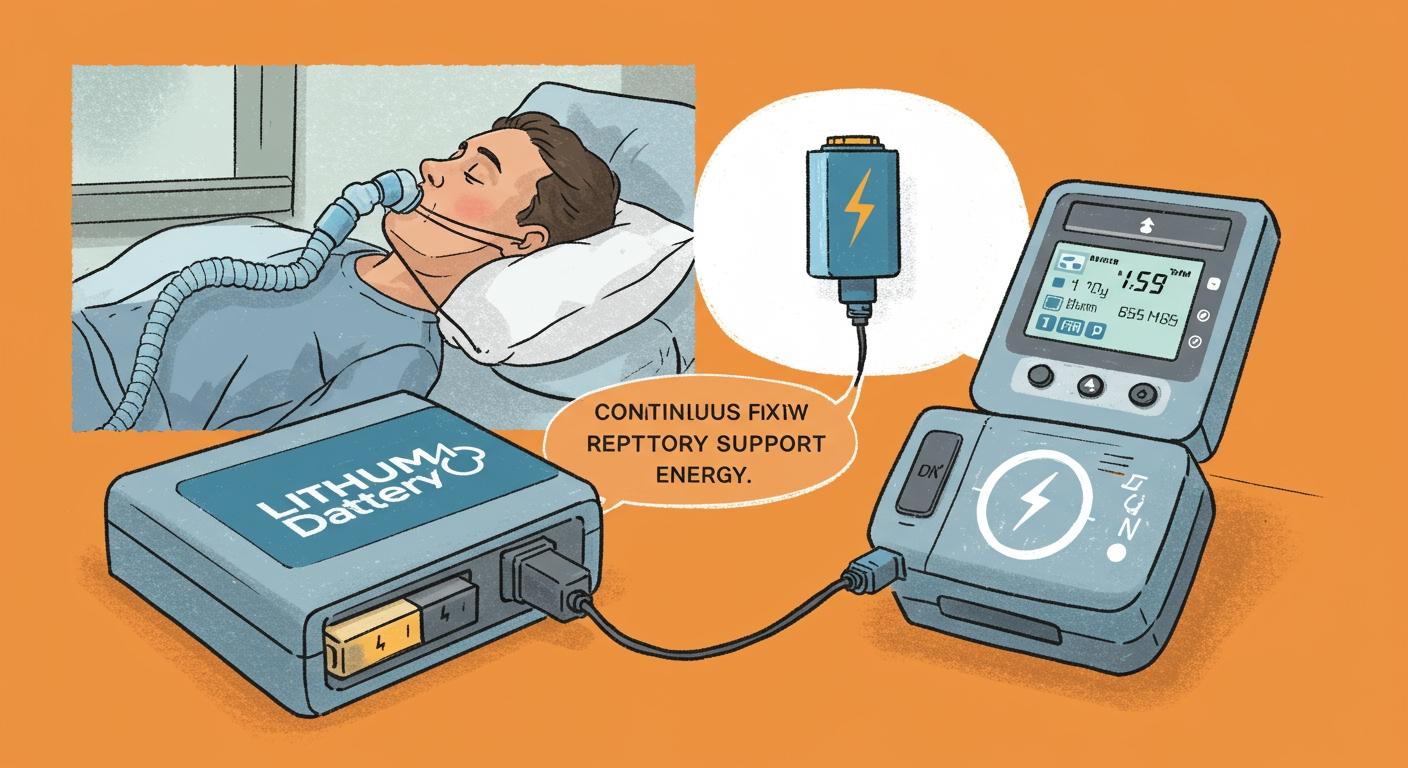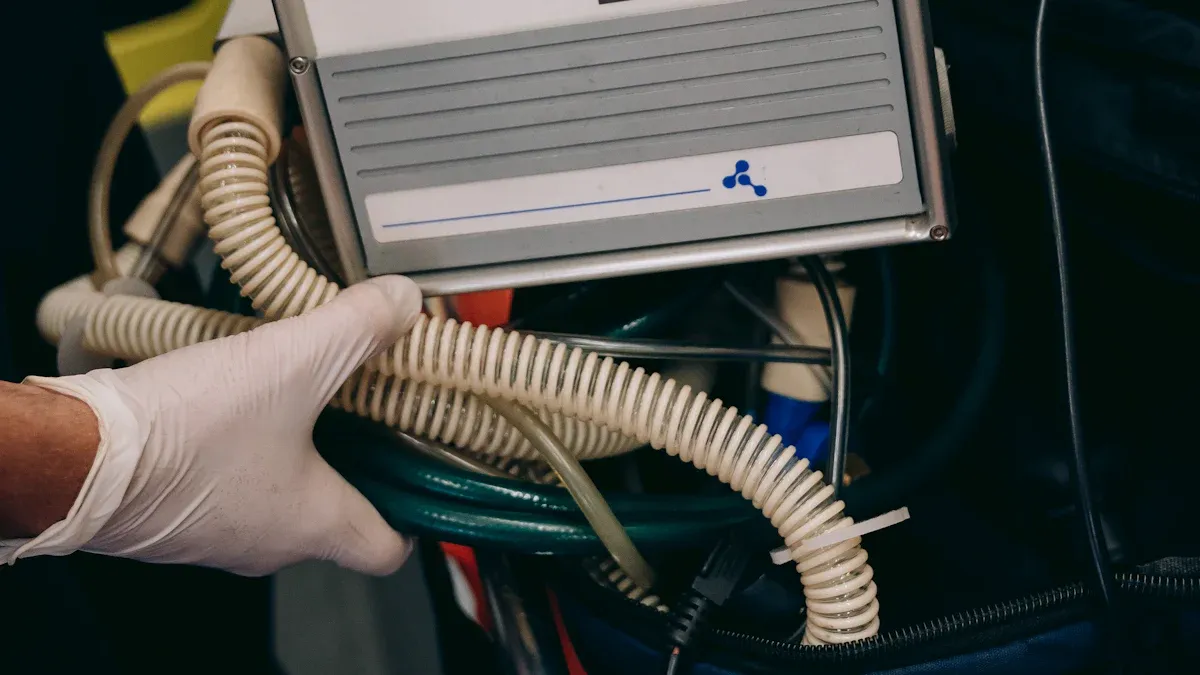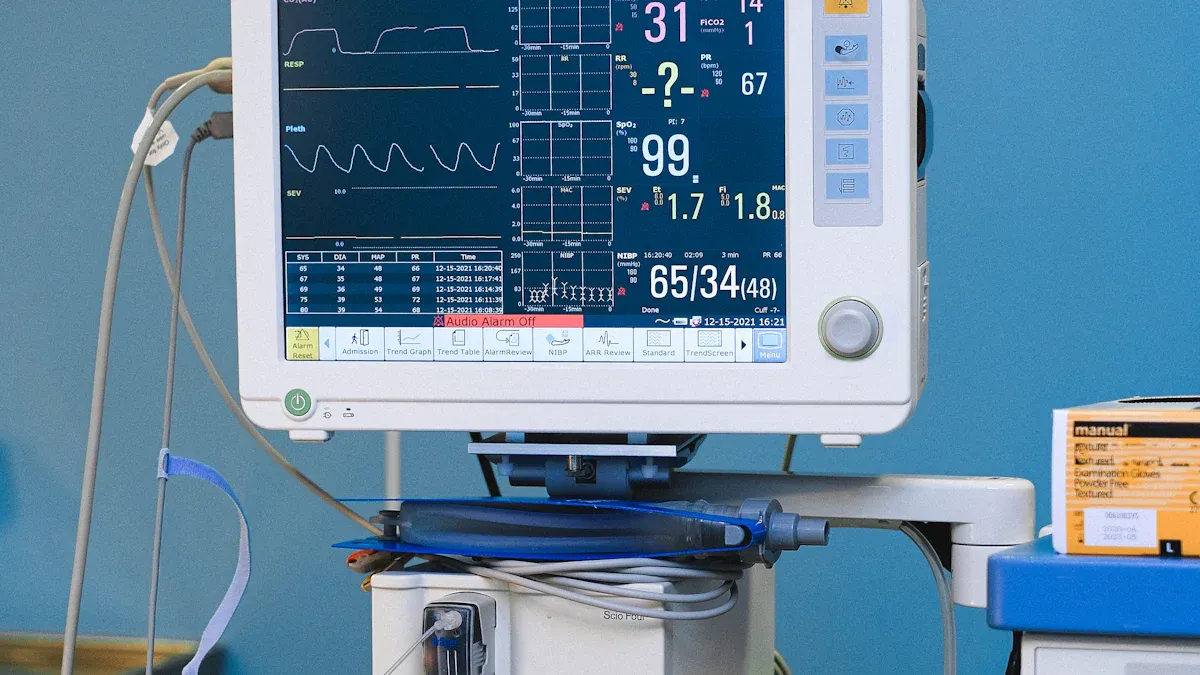
Lithium batteries play a vital role in keeping your medical respiratory devices running without interruption. In healthcare settings, you need steady power for every ventilator to ensure reliable support for patients. Lithium battery packs stand out due to their efficiency, long runtime, and portability. You can count on hot-swappable features, which let you change a battery without stopping critical care.
Recent healthcare studies highlight that lithium batteries offer these key benefits:
Safety with no hazardous metals
High energy density for powerful performance
Longevity through hundreds of charge cycles
Fast charging, crucial for hospital use
Low maintenance, maximizing uptime
You will see lithium battery systems excel in emergency or temporary medical setups, where portability and reliability matter most. Compared to other power sources, lithium battery solutions offer you practical advantages worth considering.
Key Takeaways
Lithium batteries ensure uninterrupted power for medical devices, keeping patients safe during outages.
Hot-swappable battery packs allow for quick changes without stopping ventilators, enhancing patient care.
Lithium batteries offer high energy density, providing longer runtimes and reducing the need for frequent replacements.
Regular maintenance and monitoring of battery systems are crucial for compliance with safety standards.
Safe disposal and recycling of lithium batteries protect the environment and ensure regulatory compliance.
Part1: Power Needs in Medical Devices
1.1 Importance of Uninterrupted Power
You need uninterrupted operation for every ventilator and sleep therapy device in your facility. When you use lithium battery packs, you ensure that medical equipment delivers uninterrupted therapy, even during power fluctuations or outages. Reliable power keeps your patients safe and supports critical care at all times. In clinical settings, lithium batteries—such as lithium-ion and lithium polymer—provide consistent energy delivery. These batteries meet strict international standards, including IEC 62133 for rechargeable batteries and IEC 60086-4 for non-rechargeable lithium batteries. Devices in North America must also comply with UL 1642/2054 for medical device clearance.
Battery Type | Relevant Standard |
|---|---|
Rechargeable batteries | IEC 62133 |
Non-rechargeable lithium batteries | IEC 60086-4 |
Devices sold in North America | UL 1642/2054 |
Tip: Always keep your equipment connected to a reliable power source. Use an Uninterruptible Power Supply (UPS) and check battery charge levels regularly to maintain safety.
1.2 Risks of Power Loss
Power loss can put patient safety at risk. If a ventilator stops working, the patient may lose access to uninterrupted therapy. Hospitals have faced serious challenges during disasters. For example, after the 2011 Great East Japan Earthquake, 75% of new pediatric inpatients needed durable medical equipment, including ventilators. During Hurricane Sandy, emergency visits for respiratory device failure increased sharply after power outages. Research from the 2003 blackout in the United States showed that 23 out of 255 patients experienced medical device failures, highlighting the dangers of losing power.
Documented incidents of ventilator failures due to power loss show the need for reliable battery solutions.
Loss of functioning ventilators during outages creates significant risks for patient safety.
Reliable lithium battery packs with advanced safety features help prevent these incidents.
Incident Description | Implications for Patient Safety |
|---|---|
Power failure in ventilators | Recognized as an important risk to patients, leading to potential harm during intra-hospital transfers. |
1.3 Regulatory Requirements
You must follow strict safety and regulatory standards for all medical devices. Lithium battery packs must meet international and regional standards to ensure safety features and uninterrupted therapy. Regular maintenance and testing of battery systems are essential for compliance and patient safety. Medical device clearance requires adherence to standards like IEC 62133, IEC 60086-4, and UL 1642/2054. These regulations help you provide safe, reliable care and protect your patients from the risks of power loss.
Part2: Lithium Batteries in Ventilator Systems

2.1 Advantages of Lithium Batteries
You rely on lithium battery packs to keep ventilator systems running without interruption. Lithium batteries deliver high energy density, which means you get more power in a smaller, lighter package. This feature increases portability for ventilators and portable ventilators, making them easier to move between patient rooms or emergency locations. You benefit from lithium-ion batteries and lithium polymer batteries because they provide consistent power output and fast charging. These qualities help you minimize downtime and keep medical devices ready for use.
Lithium batteries stand out for their long runtime and durability. You can see the difference in the number of charge-discharge cycles compared to other battery types:
Battery Type | Charge-Discharge Cycles |
|---|---|
Lithium Polymer Batteries | 1500-2000 |
Lithium-Ion Batteries | 500-1000 |
Portable ventilators depend on these cycles for reliable operation over time. You get fewer replacements and lower maintenance costs. Lithium battery packs also support high-performance portable power supplies, which are essential in emergency situations and remote medical setups.
Note: Lithium batteries are compact and lightweight. You can deploy ventilators quickly in emergency scenarios, even when power supply is unreliable.
You also gain these benefits:
Faster charging than older battery types.
Longer lifespan, reducing replacement frequency.
Consistent power output, preventing device failures.
2.2 Hot-Swappable Battery Packs
You need ventilator systems that never stop working, especially in critical care environments. Hot-swappable lithium battery packs let you replace batteries without shutting down the ventilator. This feature ensures continuous operation for portable ventilators and other medical devices. You can swap a battery while another charges, so patient care never gets interrupted.
Hot-swappable lithium battery packs offer these advantages:
Quick battery changes without powering down devices.
Continuous operation in intensive care units and during surgeries.
Maintenance on devices without interrupting patient care.
Increased productivity in healthcare facilities.
Tip: Hot-swappable lithium battery packs eliminate downtime during battery changes. You keep ventilators running smoothly, even in emergency situations.
If you want to learn more about battery management systems (BMS) and how they support safe battery operation, visit BMS and PCM.
2.3 Capacity for Sleep Therapy Devices
You must ensure that sleep therapy devices have enough battery capacity for overnight use. Lithium battery packs provide the runtime you need for uninterrupted therapy. A sleep therapy device requires a battery that lasts at least 8 to 12 hours. Lithium polymer batteries and lithium-ion batteries meet this demand with capacities ranging from 300 to 800 Wh. You can rely on these batteries for 1-3 nights of continuous operation.
Lithium polymer batteries offer high energy density, slim form factors, and low self-discharge rates. You get efficient portable sleep therapy devices that maintain charge over time. For example, a 3.7V / 6000mAh lithium polymer cell can power a sleep therapy device for about 8 hours at 15W. These batteries also meet international safety standards, such as IEC 60601-1, which is crucial for medical applications.
High energy density: 200–300 Wh/kg for lithium polymer batteries.
Slim design: Less than 5mm thick for compact medical equipment.
Low self-discharge: Under 3% per month, so batteries stay charged longer.
Safety compliance: Meets IEC 60601-1 for medical use.
Reliable runtime: 8 to 12 hours for sleep therapy devices.
Callout: You can trust lithium battery packs to deliver the capacity and reliability needed for sleep therapy devices in hospitals, clinics, and emergency situations.
Part3: Portable Ventilators and Emergency Use

3.1 Mobility and Rapid Deployment
You need portable ventilators that move quickly and work reliably in emergencies. Lithium battery packs make this possible. You can deploy ventilators in ambulances, field hospitals, and disaster zones without waiting for external power. Lithium batteries offer high energy density, so devices stay lightweight and easy to carry. A ventilator with a 3.7V / 6000mAh lithium polymer cell provides up to 8 hours of runtime. You can swap batteries without stopping the ventilator, thanks to hot-swap capabilities. This feature keeps patient care continuous.
Feature | Details |
|---|---|
Battery Capacity and Runtime | A 3.7V / 6000mAh lithium polymer cell can provide up to 8 hours of runtime. |
Weight and Portability | Devices should weigh under 1.5 kg for easy handling in emergencies. |
Hot-Swap Capabilities | Enables battery replacement without interrupting ventilator operation. |
Safety and Compliance Standards | Must meet standards like IEC 62133, UN38.3, ensuring reliability and patient safety. |
You see lithium battery packs used in robotics, security systems, and industrial tools for similar rapid deployment needs. Standardized lithium-ion and lithium polymer chemistries ensure consistent performance across these sectors.
3.2 Temporary Medical Facilities
You face unique challenges in temporary medical facilities. Lithium batteries give you longer operation times for portable ventilators, so you do not need frequent battery changes. You benefit from shorter charging times, which means ventilators are ready faster during emergencies. Lithium battery packs last longer, so you spend less time on replacements and maintenance. You can move ventilators easily because lithium batteries are more portable and customizable than generator-based systems. These batteries produce less noise and pollution, which helps maintain a calm medical environment.
Higher capacity supports longer ventilator operation.
Shorter charging times enable quick readiness.
Longer lifespan reduces replacement frequency.
Greater reliability under unpredictable conditions.
Portability and customization simplify transport and setup.
Low noise and pollution improve patient comfort.
You also see lithium battery packs supporting backup power in infrastructure, consumer electronics, and industrial automation, where reliability and mobility matter.
3.3 Reliability in Emergencies
You depend on lithium battery packs for backup power during emergencies. Portable ventilators must work without interruption, even when the main power fails. Lithium batteries deliver consistent power output, so you avoid device shutdowns. You can trust lithium battery packs to meet strict safety standards, including IEC 62133 and UN38.3. These standards protect patients and staff in critical situations. You find similar reliability in security systems and robotics, where lithium batteries keep devices running during power outages.
Tip: Always check battery charge levels and keep spare lithium battery packs ready for backup. This practice ensures your portable ventilators stay operational in any emergency.
Part4: Lithium Battery vs. Other Power Sources
4.1 Lead-Acid Batteries
You often compare lithium battery packs with lead-acid batteries when choosing battery solutions for ventilator systems and other medical devices. Lithium batteries offer much higher energy density and lighter weight, which makes them ideal for portable applications. You can see the difference in energy density and weight in the following list:
Lithium batteries deliver 200-260 Wh/g, while lead-acid batteries provide only 50-70 Wh/g.
For the same battery runtime, lead-acid batteries are 3 to 5 times heavier than lithium batteries.
Lithium-ion batteries store 3-4 times more energy than lead-acid batteries of the same weight.
Lead-acid batteries typically offer 30-50 Wh/kg, while lithium-ion batteries deliver 100-265 Wh/kg.
You benefit from lithium battery solutions because they reduce the overall weight of your portable ventilator systems. This advantage supports rapid deployment in emergency and temporary medical facilities. You also gain longer battery runtime and improved safety features, which are essential for meeting safety standards in healthcare environments.
Feature | Lithium Batteries | Lead-Acid Batteries |
|---|---|---|
Maintenance Frequency | Low (longer service life) | High (frequent maintenance needed) |
Charging Speed | Rapid (quick turnaround) | Slow (longer charging times) |
Weight | Up to 70% lighter | Heavier |
Run Time | Extended (longer operational time) | Shorter (frequent recharging needed) |
Safety Features | Built-in battery management systems | Basic safety features |
Overall Reliability | High (consistent power delivery) | Moderate (prone to failure) |
Tip: You should choose lithium battery packs for portable medical devices when you need longer battery runtime, lower maintenance, and advanced safety features.
4.2 Generators and External Power
You may use generators or external power sources as backup power for ventilator systems in hospitals and field clinics. However, lithium battery solutions provide several advantages over generators. Lithium batteries operate quietly and do not produce harmful exhaust, which helps you maintain a safe and comfortable medical environment. You avoid the noise and emissions that come with generator use. Lithium battery packs also charge faster and last longer, reducing downtime for critical medical equipment.
You can deploy portable ventilator systems powered by lithium batteries in emergency situations without relying on external power infrastructure. This flexibility supports rapid response and continuous care. You meet safety standards more easily with lithium battery solutions, as they include advanced safety features and battery management systems.
Note: You should keep lithium battery packs ready for backup power in all medical and industrial settings. This practice ensures uninterrupted operation during emergencies and power outages.
4.3 Backup and Redundancy
You need reliable backup power for ventilator systems and other medical devices in critical care environments. Lithium battery packs ensure uninterrupted power supply during outages, which is vital for patient safety. Unlike generators, lithium batteries provide quiet, emission-free backup power. You benefit from longer battery runtime and shorter charging times, which reduce downtime for essential equipment.
Lithium battery solutions offer built-in safety features and battery management systems, helping you meet strict safety standards. You can use lithium battery packs for backup power in medical, robotics, security, infrastructure, and industrial sectors. This versatility supports redundancy and reliability in every application.
Callout: You should always keep spare lithium battery packs available for backup power. This strategy helps you maintain continuous operation and meet safety standards in emergency situations.
Part5: Practical Considerations
5.1 Battery Selection
You need to choose the right lithium battery for your medical devices. Reliable power is essential for ventilators, portable cpap battery packs, and other critical equipment. When selecting a battery, consider these factors:
Ensure the lithium battery meets strict safety and performance standards.
Look for high energy density to maximize runtime and reduce device weight.
Choose batteries that support backup power for uninterrupted operation.
Select compact designs to enhance portability for field use.
Confirm compatibility with your device’s battery management system (BMS).
Lithium battery packs provide unmatched energy efficiency and reliability. You can use them in portable cpap battery systems, infusion pumps, and robotics. A battery failure in a critical device can pose life-threatening risks, so always prioritize quality and compliance.
5.2 Maintenance and Safety
Proper maintenance ensures the safety and longevity of your lithium battery packs. You should:
Monitor battery status regularly and replace batteries before they reach end-of-life.
Avoid exposing batteries to extreme temperatures or risky environments.
Follow manufacturer’s charging instructions and use approved chargers.
Store batteries in a cool, dry place to prevent degradation.
Check battery charge levels often, especially for backup power systems.
You must comply with standards like ANSI/AAMI ES 60601-1, IEC 62133, IEC 60086 Part 4, and UL 1642. These standards help you maintain safety in all applications, from medical to industrial and security systems.
Incident Type | Description |
|---|---|
Fumes | Off-gassing from lithium-ion batteries can release toxic gases, leading to evacuations. |
Blasts | Explosions from thermal runaway can cause severe damage and risk to patients. |
Device Failures | Battery ignition or combustion has led to recalls and critical injuries in healthcare settings. |
Tip: Always keep backup lithium battery packs available to ensure continuous operation during emergencies.
5.3 Cost and Disposal
You must balance cost and performance when choosing a lithium battery. High-performance chemistries like Lithium Nickel Manganese Cobalt Oxide (NMC) offer superior energy density but come at a higher price. Over the lifespan of your device, lithium battery packs often provide better value due to longer runtime and fewer replacements. However, exposure to high temperatures can reduce battery life and increase costs.
Proper disposal is vital for safety and environmental protection. Disinfect rechargeable batteries with wipes before disposal to prevent short-circuiting. Sort batteries by type to avoid hazardous reactions. Improper disposal can release harmful chemicals, contaminate soil and water, and even cause fires in waste facilities.
To manage disposal responsibly:
Implement structured lithium battery recycling programs.
Partner with certified recyclers for end-of-life battery management.
Follow guidelines from organizations like Practice Greenhealth.
Callout: Safe disposal and recycling of lithium battery packs protect both your staff and the environment, while ensuring compliance with regulations.
You rely on lithium batteries to maintain uninterrupted support for respiratory devices in every medical setting. These batteries offer reliability, portability, and readiness for emergencies. To optimize performance, you should choose high energy density batteries, perform regular maintenance, and recycle safely.
Key Strategy | Benefit |
|---|---|
High energy density | Longer runtime |
Regular maintenance | Improved reliability |
Safe recycling | Environmental protection |
Stay updated on new lithium battery advancements, such as improved safety layers and real-time monitoring, to enhance support and safety.
FAQ
What makes lithium battery packs ideal for medical ventilators?
Lithium battery packs offer high energy density, long runtime, and lightweight design. You can deploy ventilators quickly in hospitals, field clinics, or emergency sites. These batteries meet strict safety standards, supporting uninterrupted patient care.
Tip: Choose lithium Nickel Manganese Cobalt Oxide (NMC) for maximum energy density in portable medical devices.
How do lithium battery packs improve reliability in industrial and security systems?
You gain consistent power output and advanced safety features with lithium battery packs. These batteries support robotics, security cameras, and industrial automation. You reduce downtime and maintenance costs, ensuring continuous operation in critical environments.
Sector | Benefit |
|---|---|
Robotics | Extended runtime |
Security | Reliable backup power |
Industrial | Fewer replacements |
What safety standards should you check for lithium battery packs in healthcare?
You must verify compliance with IEC 62133, UL 1642, and ANSI/AAMI ES 60601-1. These standards ensure safe operation and minimize risks. You protect patients and staff by choosing certified lithium battery packs for respiratory support devices.
Note: Regular maintenance and monitoring help you meet safety requirements.
Can you use lithium battery packs for backup in infrastructure and consumer electronics?
Yes, lithium battery packs provide reliable backup power for infrastructure systems and consumer electronics. You benefit from fast charging and long cycle life. These batteries support uninterrupted service during outages or emergencies.
Infrastructure: Backup for critical systems
Consumer electronics: Extended device uptime
How should you dispose of lithium battery packs safely?
You must follow structured recycling programs and partner with certified recyclers. Disinfect batteries before disposal and sort by chemistry type. Safe disposal prevents environmental harm and meets regulatory requirements.
Callout: Responsible recycling protects your staff, patients, and the environment.




